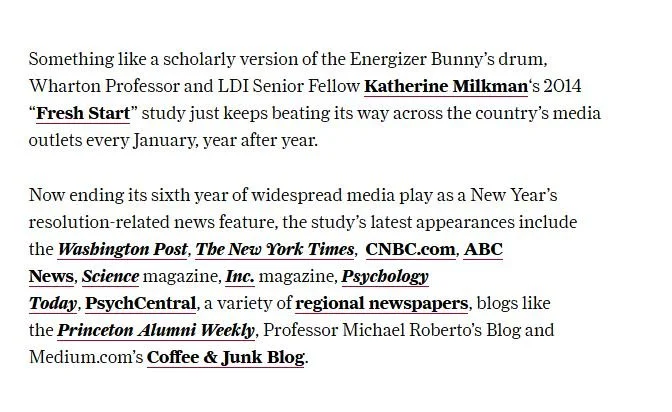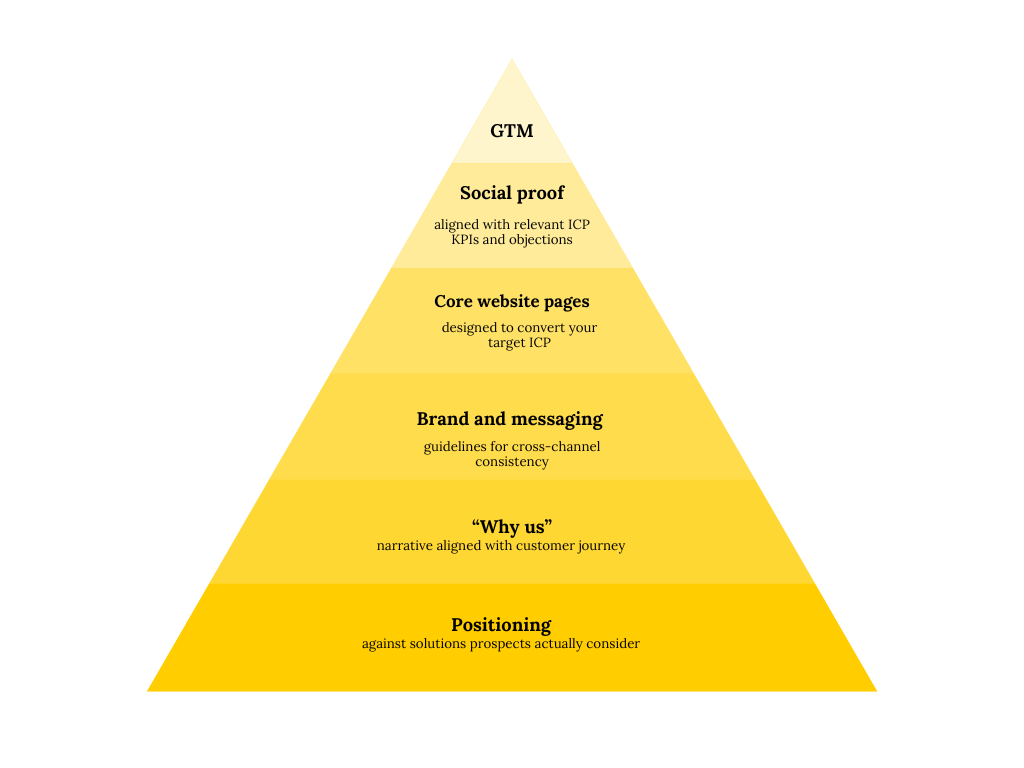When to do a complete website overhaul… and when not to
Q1Q2 is *always* the website redesign season. But is it the right call for your startup?
Did you know that temporal landmarks motivate aspirational behavior?
In my B2B SaaS conversion copywriting world, “aspirational behavior” + “temporal landmarks” almost always equals “new website copy in Q1Q2.”
And that makes absolute sense: website updates, especially when they also involve redesign, are a huge undertaking and definitely have that “new year, new you” vibe to them.
But are they always the next best thing to do for startups?
Something I’ve been wondering about is: are there situations when it is more productive to approach website updates as a series of mini-sprints, instead of a full overhaul?
An obvious reason to do a complete overhaul is when your website is actually preventing conversions from happening. Some examples of when copy overhaul was the right decision:
High bounce rates combined with low scroll depth across key pages
Bad-fit prospects reaching out more often than ideal prospects
Prospects confused about product capabilities during demos or sales calls
Past-its-due-date copy that doesn’t accurately represent the product
Assumptions-fueled copy that doesn’t speak to ICPs’ actual goals
If you’re not sure if your website is repelling prospects — and why you don’t see more conversions — I run website audits
Check out Conversions at Full Throttle audits here
Otherwise, it’ll probably feel like planning a year’s worth of copy in advance (“nigh on impossible”).
Here’s what makes it safer in my opinion:
Faster reaction time
No “ugh, research takes forever” barrier
Less friction making in-between changes (sunk cost fallacy is a thing)
Unless, of course, it becomes an endorsement for random acts of best-practices-fueled copywriting.
Here’s how I think about it:
Research — even if it’s not a 3-months-long series of interviews with all relevant segments — helps understand prospects, plus current and churned customers
Copy — translates research into words
Validation — only counts when you can explain why the copy feel flat or worked (ignoring 100% of design or layout changes in this case), otherwise you’re back to square 1 because you still don’t know the “why”
“Yeah, but why do we think this is the right thing to do?”
This question is important enough to make a GIF
These 4 types of research should keep guesswork in check:
Internal interviews: changes in prospects’ behavior and concerns, conversations around renewals, and changes in product usage
Hotjar and Google Analytics data: baseline understanding of what’s working (or not) — and where copy may have started falling short
Interviews with users: use cases, opportunities and challenges, and voice-of-customer data
Industry context: yes, competitors, but also buying behavior, decision-making, and overall economic climate
Feedback loops and how to loop them: read more here
It also means that you’re not trying to eat the website redesign elephant in 2 months, have shorter feedback cycles, and more flexibility to react to market changes (and another benefit: if website update sprints are on the calendar, then optimizing lead magnet signup pages, adding social proof, and/or new logos, and generally staying on top of website to-dos also become much easier).
(Also: less of a budget drain)
But which one is the right one to pick? As always, the only right answer is “It depends…”
This is where I’d start:
Is the website doing its job?
What, if anything, can be improved?
Is this the right problem to solve? (Retention may be a bigger problem atm)
If it is the right problem, what is the fastest way to solve it (on budget)?
As with (almost) everything copy-related, the answer is “It depends…” Unless you have a sky-high bounce rate and no website conversions.
tl;dr: yes, it is possible to move fast with website copy updates without breaking things. Need help figuring out how? Reach out.
I help B2B SaaS startup founders and marketers get more traction with research-driven conversion copy — without slowing down their growth initiatives.
Hire me for:
Website audit to find & fix conversion blockers
Day rates to optimize your landing pages, web copy, or email sequences for more clicks and signups






![[S2E6] How to build a content ecosystem to convert and support users](https://images.squarespace-cdn.com/content/v1/510fa084e4b060f86e73735a/1750284561646-AA8WDFHRFZ32GQO5GI51/S2E6+Podcast+Cover+visuals.png)
![[S2E5] Practical Guide to Wynter Messaging Tests](https://images.squarespace-cdn.com/content/v1/510fa084e4b060f86e73735a/1747226672649-1AU6KQD4RIGSNSIIQLGW/Solo_episode_cover.png)
![[S2E4] How to: message testing on a budget](https://images.squarespace-cdn.com/content/v1/510fa084e4b060f86e73735a/1744221834434-TF0URFQBJNYQPPMKQNHK/alex_atkins_cover_image.png)
![[S2E3] How to: positioning](https://images.squarespace-cdn.com/content/v1/510fa084e4b060f86e73735a/1742493000706-NG82ZT4YFEM2AFCDG03N/S2E3_Josh+Garofalo_COver+Image.png)
![[S2E2] How to find winning angles for your competitor pages](https://images.squarespace-cdn.com/content/v1/510fa084e4b060f86e73735a/1740671619617-YYWZU1UAQOHY3RDFNTIC/YDGW_S2E2.png)